Too many links to wait ’til quarter’s end again, so I’m planning on reverting to a monthly schedule of the best recent links. Thanks to the many readers who point me to these, so I can almost keep up.
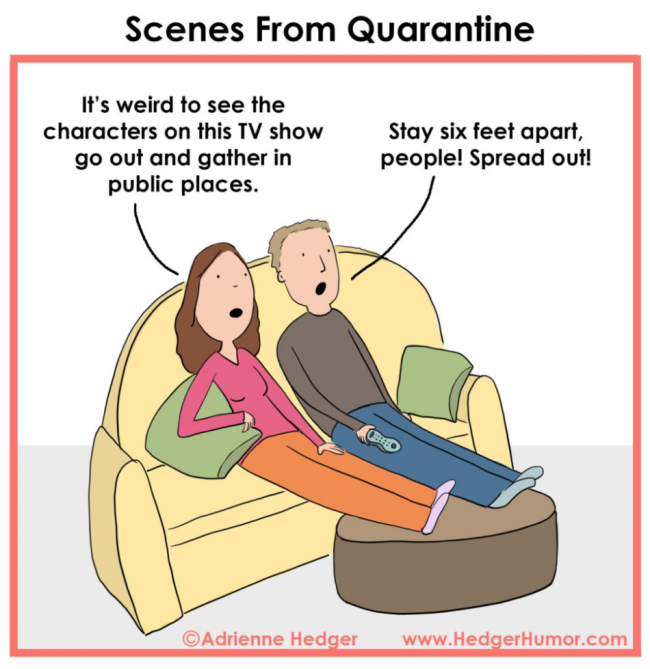
Cartoon by the brilliant Adrienne Hedger
How’s It Gonna End, by Tom Waits & Kathleen Brennan
He had three whole dollars, a worn out car,
and a wife who was leaving for good
Life’s made of trouble, worry, pain and struggle
She wrote ‘good bye’ in the dust on the hood
They found a map of Missouri, lipstick on the glass —
They must of left in the middle of the nightAnd I want to know the same thing everyone wants to know
How’s it going to end?Behind a smoke colored curtain, the girl disappeared
They found out that the ring was a fake
A tree born crooked will never grow straight
She sunk like a hammer into the lake
A long lost letter and an old leaky boat —
Promises are never meant to keepAnd I want to know the same thing — I want to know
How’s it going to end?The barn leaned over, the vultures dried their wings
The moon climbed up an empty sky
The sun sank down behind the tree on the hill
There’s a killer and he’s coming through the rye
But maybe he’s the father of that lost little girl
It’s hard to tell in this lightAnd I want to know the same thing everyone wants to know
How’s it going to end?Drag your wagon and your plow over the bones of the dead
Out among the roses and the weeds
You can never go back, and the answer is ‘no’
And wishing for it only makes it bleedJoel Tornabene was broken on the wheel
Shane and Bum Mahoney on the lam
The grain was as gold as Sheila’s hair
All the way from Liverpool, with all we could steal
He was robbed of twenty dollars, his body found stripped
Cast into the harbour there and drownedAnd I want to know the same thing we all want to know
How’s it going to end?The sirens are snaking their way up the hill
It’s last call somewhere in the world
The reptiles blend in with the color of the street
Life is sweet at the edge of a razor
And down in the first row of an old picture show
The old man is asleep, as the credits start to rollAnd I want to know the same thing we all want to know
How’s it going to end?
PREPARING FOR CIVILIZATION’S END

Photo from Facebook, source un-cited. Apparently the photo long-precedes the virus.
Much has been written lately about the connection between pandemics and the other harbingers of societal and civilizational collapse. Several writers have been quick to say “I told you so” and predict that the economic collapse that will follow this pandemic will be the first domino in complete civilizational collapse. So while it is true that all of the major potential threats to our civilization’s continuance are interrelated, we’re still (wrongly IMO) predisposed to think of collapse as a sudden, one-shot, one-time thing. (Perhaps that’s why many are also thinking that this pandemic is a once-a-century, one-shot thing, when it surely is not.)
But what we have learned from the demise of past civilizations is that (1) collapse occurs over decades, even centuries, in fits and starts, with partial “recoveries” in between, and attempts (mostly in vain) to shift to a more sustainable way of living, and (2) collapse is not uniform in where and how it strikes. For many people in struggling nations, civilization’s final collapse won’t appear very different from how they’re living now.
LIVING BETTER
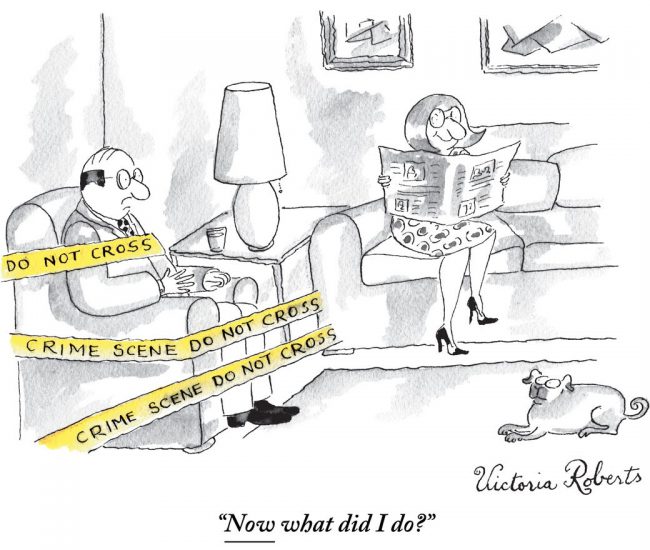
Cartoon by Victoria Roberts in The New Yorker
The ultimate remote work policy: In three words: “We trust you.” Most remote workers, from far-flung “help desks” to boiler shop telemarketers, have never been trusted by their employers; they are mostly more like outside contractors, given impossible performance targets, no advancement opportunities, and required to log in and out and produce paperwork to “prove” they’re working. If CoVid-19 has no other positives, it may force a re-think of the value of remote work, and of the value of those doing it. But to expect most large corporations to start trusting their employees, particularly those they can’t keep their eyes on, is probably asking too much. (Thanks to Tree Bressen for the link, and the one that follows.)
Story-based strategy: A change methodology based on undermining dangerous, flawed stories, crafting articulate, compelling alternative stories, and leading with them to advance your activist objectives; the methodology also suggests how and when to intervene to change the status quo.
John Prine’s masterpiece: We just lost John to CoVid-19. Possibly his finest work was Hello in There, a stirring reflection on loneliness and isolation that is especially poignant in these times of anxiety and quarantine, particularly for seniors.
POLITICS & ECONOMICS AS USUAL
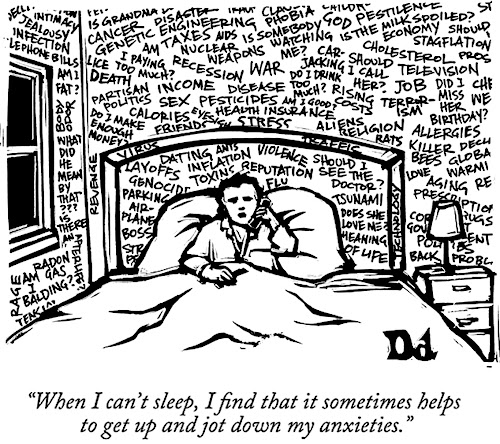
Cartoon by Drew Dernavich in the New Yorker
Why Americans are dying of despair: Atul Gawande explains how inequality, precarity, poor nutrition, and the large-scale loss of meaningful work have created a populace dying from the commensurate epidemics of physical, social and mental disease.
The price of oil in the just-in-time economy: I have written before about how our just-in-time economy makes oil prices wildly volatile. We consume globally (in “normal” times) 100 million barrels of oil a day, and our global oil refining capacity is the same, just one day’s supply, but as demand has dropped in recent months by about 20%, refiners have to close down because there is no place to put the excess. Global storage capacity is just 12 days’ supply, and they already have no place to put what is being produced. As a result, crude oil prices fell from an already-low $30/bbl to -$2/bbl recently (ie producers had to pay people to take possession of their surplus oil). Alberta Tar Sands bitumen sludge is still trading at about $0. Fracking operations, which need to get about $60/bbl for their oil to break even, are substantially bankrupt at this stage, after years of massively taxpayer-subsidized production and, reportedly, payment of huge dividends and bonuses to preferred shareholders and executives. What will happen next? Likely, the banks will take them over and operate them until (hopefully) prices recover, or they will be simply shuttered. Then, when demand rises again, the tightness of refining and storage capacity and the loss of affordable sources of supply will mean shortages, and whipsawing prices. (Thanks to Tree Bressen and Paul Cienfuegos for the link, and the one that follows.)
Gaslighting in overdrive: In an age of institutionalized lying, a new word has entered our everyday vocabulary. Gaslighting is obfuscating the truth so persistently and convincingly that the listener doubts their own understanding, or even sanity. It was originally used to explain the trauma that serial abusers inflict on their victims, but thanks to the collapse of political morality, and the unwillingness of social media to stanch the flood of disinformation they host, it is now SOP just about everywhere. And now, with a citizenry frightened and confused about the pandemic, there are unprecedented opportunities for politicians and corporations to gaslight us into believing we’re the problem (and they’re the solution).
Thomas Piketty on our broken economy: “The problem is not supply; it’s inequality.” The celebrated economist’s newest book eschews identifying enemies and instead explains how our economic systems have failed because of faulty ideologies, and how they could quickly be improved to everyone’s advantage. Unfortunately, that would require major coordinated, global reforms to tax regimes and debt cancellations; don’t hold your breath.
David Graeber on our broken economy: In a pre-pandemic article, David reviews a new book on economics that shows that most of the anti-Keynesian economic principles now in favour (eg the efficient market hypothesis, the value of austerity, the quantity theory of money, and the presumption that people act generally in their own selfish interest) have never been, and are not, supported by evidence, which actually shows none of them is true. Nevertheless, these wrong-headed principles continue to be cited to support equally wrong-headed practices, while “radical” alternatives (eg blanket debt forgiveness, progressive wealth taxes in place of income tax, guaranteed annual incomes) that have repeatedly been shown to work well are dismissed as “unaffordable” or “unworkable”.
More verbal diarrhea from Bret Stephens: The NYT’s controversial racist, eugenicist, climate change denier is now calling for an immediate end to the pandemic lockdown outside of New York City. “Balanced” reporting, or what detractors are now calling the NYT’s propensity for “both siding” every issue, does not mean giving dangerous morons a soapbox for unsupported opinions. We need better from you, NYT.
What, a CO2 shortage?: In perhaps the ultimate irony, the impact of CoVid-19 on supply chains has created a shortage of (industrial) CO2 for use in water treatment, food production and preservation.
CO-VID CORNER
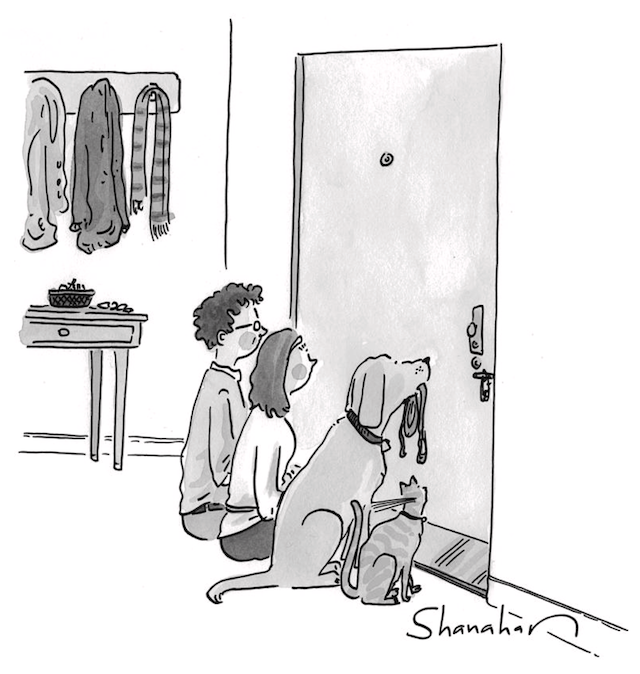
Cartoon by Danny Shanahan in The New Yorker
Lost in the mad rush to find ways to detect, protect and vaccinate ourselves against, and defeat CoVid-19, has been much discussion over its causes, or how we might prevent its recurrence. Indeed, the threat of pandemics has been loudly and repeatedly warned about by scientists for decades, but their warnings were conspicuously ignored. And we know that infectious disease pandemics all originate from cross-species migration to humans from hunted “exotic” species and from the massive disease incubators that are factory farms — in other words, from our systematic cruelty to other animals. Yet seemingly we are going to continue to ignore the known cause and the certain recurrence of these ghastly killers of our species, while fruitlessly pursuing unreliable, temporary and colossally expensive tech “fixes”. This is madness on a climate-change denial scale.
Trump’s blockade stops states and hospitals from getting PPE: A gripping report on how the FBI and DHS are interfering with state and hospital authorities’ attempts to get essential supplies for medical workers treating victims.
I am a mad scientist: A NASA scientist rails against anti-science politicians and against scientists too meek to speak the truth to power. (Thanks to Tree Bressen for the link and the one that follows.)
The bottom line on masks and gloves: From an emergency doctor —
-
- Wear a mask when you are in “exposure” zones (mainly places with other people).
- Treat your home, car, and yard as safe places (no mask or gloves).
- Be on high alert on what you are doing with your hands when you are in “danger zones.” This is when you must not touch your face.
- Consider wearing gloves (even winter gloves or work gloves can be helpful) but only for short periods of time and only when in “touch exposure” danger zones.
- Remove your gloves (and mask) when you return to your safe place.
- Wash your hands every single time you take off your gloves or mask or move from a danger zone back to a safe zone.
- When you are at home and after washing up, you can relax, scratch your nose, rub your eyes and floss your teeth…without worry.
Co-Vid stories: Some of these provide an amazing insight not only into the impact of the pandemic but into the way of life in many countries and communities of the world:
-
- Life on lockdown in China
- New York at its best and worst
- Dispatches from a pandemic: 12 views from around the world
- Postcards from a pandemic: 12 new artworks that accompanied the above Dispatches in the print edition of The New Yorker
- How I made it through: A survivor’s story
- Six countries, six strategies: How six countries have navigated the pandemic in very different ways
Co-Vid humour:
-
- Billions of viruses gather outside Michigan state capitol to demand end of social distancing
- Governments anxiously await modelling to predict when they can resume cutting health budgets
- Bank CEO reassures worried Canadians: “I’m going to be okay”.
- The official Coronavirus Guidelines (shortened and edited from an un-cited list circulating on the internet):
- Basically, you can’t leave the house for any reason, but if you have to, then you can.
- Masks are useless, but maybe if you have to wear one, it can save you; it is probably ineffective, but it may be mandatory as well.
- Stores are closed, except for those that are open.
- You should not go to hospitals unless you have to go there. Same applies to doctors, you should only go there in case of emergency, provided you are not too sick.
- This virus is deadly but still not too scary, except that it might lead to a global disaster.
- Gloves won’t protect you, but they can still help.
- Everyone needs to stay HOME, but it’s important to GO OUT.
- There is no shortage of groceries in the supermarket, except sometimes in the evening, or when people panic-buy because they fear a shortage of groceries.
- The virus has no effect on children except for those it affects.
- Animals are not affected, but there is still a cat that tested positive in Belgium in February when no one had been tested, plus a few tigers here and there.
- You will have many symptoms when you are sick, but you can also get sick without symptoms, have symptoms without being sick, or be contagious without having symptoms.
- In order not to get sick, you have to eat well and exercise, but try to eat whatever you have on hand and it’s better not to go out.
- It’s better to get some fresh air, but you will attract unfriendly stares if you do. And don’t go to parks. But if you do, don’t sit down, except that you can do that now if you are old and have to, but not for too long and not if you are pregnant or too old.
- The virus remains active on different surfaces for two hours, no, four, no, six, no, we didn’t say hours, maybe days? But it takes a damp environment. But not necessarily.
- The virus stays in the air – but maybe only in an enclosed room. And if social distancing fails, all our children were probably already infected at their school before it was closed.
- If you stay at the recommended social distance, you’ll be safe, except in certain circumstances you should maintain a greater distance, when, studies show, the virus can travel further, maybe.
- We count the number of deaths but we don’t know how many people are infected as we have only tested so far those who were “almost dead” to find out if that’s what they will die of.
- We should stay locked down until the virus disappears, but it will only disappear if we achieve collective immunity, which will only happen when we are no longer locked down.
NON-DUALITY STUFF

Dave talks non-duality with Frank McCaughey: My discussion February 5th with Frank, who spent 20 years seeking liberation/awakening/whatever you want to call it, and has interviewed dozens of non-dualists and made several films on the subject. My sense is that Frank has been going through the same “terrifying” loss of the sense of having a self, that other radical non-dualists have described, and that “transition” is finally ending.
FUN & INSPIRATION

Cartoon by Harry Bliss in The New Yorker
Citizen bear: A bear wandering down a deserted highway comes across a traffic cone that’s fallen over…
Civilian accidentally ejects himself from fighter jet: He didn’t want to take the flight in the first place, but it was a gift.
Canada’s famous abandoned city: Ocean Falls on the now-remote (ten hours by road and once-a-week ferry) and very rainy (172″/year) central BC coast was once (until 1950) a 3,900-resident thriving mill town with a 400-room hotel, hospital and police force. Its dam, which once controlled water so pure it didn’t need filtering to produce pristine paper, is still used to produce energy for the handful of residents, and for the main remaining business: A bitcoin “mine”.
The existential cat: There are many videos of the famous chat noir Henri, but I think Paw de Deux is the best.
Before there were animals: Scientists think they’ve found the forerunner of all animals, dating back 555 million years. It is, of course, a worm. A gullet and an ass, what more does any animal need? But very quickly more complex animals evolved, so by 450 million years ago we had crinoids, which are still with us, including the spectacular feather stars, with moves that put a ballet star to shame. And then there are the Seussian-looking handfish, the rarest fish in the sea, that don’t swim, for reasons we simply don’t know.
How to sound like Ravel: The inimitable Nahre Sol studies and then composes a delightful song in the style of the famous French composer.
Smarty plants: Biologist Stefano Mancuso explains how plants learn, communicate, and migrate, and how their “decentralized” systems give them an evolutionary advantage.
Living in a ghost town: The Stones go retro for the pandemic.
THOUGHTS OF THE MONTH
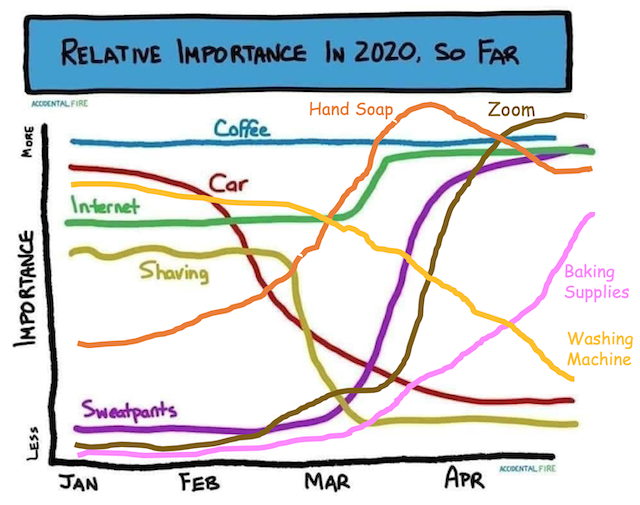
Original graphic from Accidental Fire, April 3rd, with my additions over the past 3 weeks
From Dawn Teo on Facebook:
We all have Schrodinger’s Virus now. Because we cannot get tested, we can’t know whether we have the virus or not. We have to act as if we have the virus so that we don’t spread it to others. We have to act as if we’ve never had the virus because if we didn’t have it, we’re not immune. Therefore, we both have and don’t have the virus.
Thus, Schrodinger’s Virus.
From Ben Mikaelsen:
You don’t become a better chair-maker. The chair becomes better.
From veteran Toronto health reporter André Picard:
I hope that this one is so big and so devastating that we actually take advantage of the chance to change things, that we start asking really fundamental questions. Why do we have 400,000 [Canadian] senior citizens in warehouses, where they’re at risk and where many, but not all, of them have horrible lives? We’ve got this bailout with income for people who are not working. So essentially, it’s a basic income plan. Why not just do the full monty and have basic income? We’re housing homeless people during the crisis because it’s unsafe for them to be homeless. We’ve known for 100 years that the solution to homelessness is housing, so let’s finally do it.
Joy Williams’ Eight Essential Attributes Of The Short Story
1. There should be a clean clear surface with much disturbance below.
2. An anagogical level.
3. Sentences that can stand strikingly alone.
4. An animal within to give its blessing.
5. Interior voices which are or become wildly erratically exterior.
6. Control throughout is absolutely necessary.
7. The story’s effect should transcend the naturalness and accessibility of its situation and language.
8. A certain coldness is required in execution. It is not a form that gives itself to consolation but if consolation is offered it should come from an unexpected quarter.And One Way It Differs From The Novel: A novel wants to befriend you, a short story almost never.
From Kristin Flyntz (thanks to Tree Bressen for the link):
Letter from a Virus
Stop. Just stop.
It is no longer a request. It is a mandate.
We will help you.We will bring the supersonic, high speed merry-go-round to a halt
We will stop the planes, the trains, the schools, the malls, the meetings,
the frenetic, furied rush of illusions and “obligations” that keep you from hearing our single and shared beating heart,
the way we breathe together, in unison.
Our obligation is to each other,
As it has always been, even if, even though, you have forgotten.We will interrupt this broadcast, the endless cacophonous broadcast of divisions and distractions,
to bring you this long-breaking news: We are not well.
None of us; all of us are suffering.
Last year, the firestorms that scorched the lungs of the earth
did not give you pause. Nor the typhoons in Africa, China, Japan.
Nor the fevered climates in Japan and India.
You have not been listening.
It is hard to listen when you are so busy all the time, hustling to uphold the comforts and conveniences that scaffold your lives.
But the foundation is giving way,
buckling under the weight of your needs and desires.
We will help you.
We will bring the firestorms to your body
We will bring the fever to your body
We will bring the burning, searing, and flooding to your lungs
that you might hear: We are not well.Despite what you might think or feel, we are not the enemy.
We are Messenger. We are Ally. We are a balancing force.
We are asking you:
To stop, to be still, to listen;
To move beyond your individual concerns and consider the concerns of all;
To be with your ignorance, to find your humility, to relinquish your thinking minds and travel deep into the mind of the heart;
To look up into the sky, streaked with fewer planes, and see it, to notice its condition: clear, smoky, smoggy, rainy? How much do you need it to be healthy so that you may also be healthy?
To look at a tree, and see it, to notice its condition: how does its health contribute to the health of the sky, to the air you need to be healthy?
To visit a river, and see it, to notice its condition: clear, clean, murky, polluted? How much do you need it to be healthy so that you may also be healthy? How does its health contribute to the health of the tree, who contributes to the health of the sky, so that you may also be healthy?Many are afraid now.
Do not demonize your fear, and also, do not let it rule you. Instead, let it speak to you—in your stillness, listen for its wisdom.
What might it be telling you about what is at work, at issue, at risk, beyond the threats of personal inconvenience and illness?
As the health of a tree, a river, the sky tells you about quality of your own health, what might the quality of your health tell you about the health of the rivers, the trees, the sky, and all of us who share this planet with you?Stop. Notice if you are resisting. Notice what you are resisting.
Ask why.Stop. Just stop. Be still. Listen.
Ask us what we might teach you about illness and healing, about what might be required so that all may be well.
We will help you, if you listen.(Here’s a somewhat less gentle variation on this theme, from France)





Just wanted to say thanks again Dave. While I have time to read your lens is a very pure filter for me :)
Tim
A delightful short say in the madness of it all.
Thanks